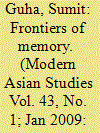| Srl | Item |
| 1 |
ID:
089364


|
|
|
|
|
| Publication |
2009.
|
| Summary/Abstract |
The past two decades have seen a dramatic renewal of interest in the subject of historical memory, its reproduction and transmission. But most studies have focused on the selection and construction of extant memories. This essay looks at missing memory as well. It seeks to broaden our understanding of memory by investigating the way in which historical memory significant to one historical tradition was slighted by another, even though the two overlapped both spatially and chronologically. It does this by an examination of how the memory of the Marathi-speaking peoples first neglected and then adopted the story of the Vijayanagara empire that once dominated southern India.
|
|
|
|
|
|
|
|
|
|
|
|
|
|
|
|
| 2 |
ID:
123725


|
|
|
|
|
| Publication |
2013.
|
| Summary/Abstract |
In February 2012 the European Commission released a video that was intended to promote the idea of European union among younger people. It shows a white woman, dressed in a golden jumpsuit, that is threatened by three men preparing to fight her. First a man, ostensibly from East Asia, jumps down in front of her performing Kung Fu. Then a practitioner of Kalaripayattu, a southern Indian martial art, levitates towards her brandishing a sabre and finally a black man cartwheels in, menacing the woman with Capoeira moves. The woman stays calm, splits into twelve versions of herself to surround the assailants, who then vanish as the twelve women turn into the twelve stars of the EU flag, accompanied by the message "The more we are, the stronger we are". The video, an attempt at viral communication, was retracted a few days after it was released - for obvious reasons. Propagating racialised threats to Europe, it is a thinly veiled attempt at promoting European unity through stoking geopolitical fears of China, India and Brazil, making individuals stand in for whole states. Its message is in tune with what Alexander Murphy diagnoses in his paper: a view of the EU as a supra-state, which is in competition with other states, and the drawing of clear boundaries of who belongs there and who does not.
|
|
|
|
|
|
|
|
|
|
|
|
|
|
|
|
| 3 |
ID:
164878


|
|
|
|
|
| Summary/Abstract |
The consolidation of numerous regional polities in the aftermath of Mughal imperial decline presented favourable socioeconomic opportunities for South Asian service communities. Protracted armed conflicts in southern India allowed a variety of mercenaries, soldiers, and war bands to accumulate resources in exchange for mobilizing manpower on behalf of states with weak standing armies. This article focuses on British imperial efforts to obtain sufficient quantities of military labour during its struggle with the Mysore sultanate. As the sultanate assumed an increasingly hostile attitude towards independent warrior power, local strongmen sought more amenable arrangements with alternate entities. The British East India Company received crucial support from autonomous warrior groups during its southern wars of conquest. Warriors in turn utilized British resources to consolidate local sovereignties. Thus, the initial British intrusion into peninsular Indian society further fragmented the political landscape by patronizing petty military entrepreneurs.
|
|
|
|
|
|
|
|
|
|
|
|
|
|
|
|